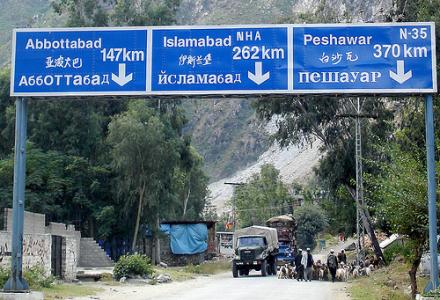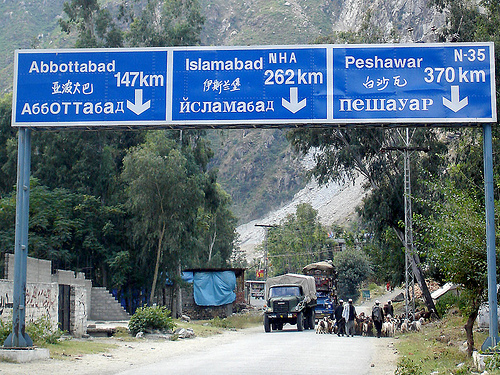
It's been a big week here in Islamabad. First off, there have two more bomb attacks, one at the naval compound down the street from where I am staying and one out in Pindi, the next town over. Secondly, Barack Obama finally announced his plans for the war in Afghanistan: 30,000 more troops now; phased withdrawal started in 18 months. Thirdly, Prime Minister Yousuf Reza Gilani completed a tour of Germany and Britain.
The three incidents shared space on the front pages of the Islamabad dailies and in the national mind. After all, while Americans heard the speech live on Tuesday night (7 am here), most Pakistanis watched it on replay later on Wednesday, and many Pakistanis did not begin responding to the policy until Thursday. Conventional wisdom did not form till the weekend, by which time the capital was also dealing with the bomb blasts and with the developing story in London, where, in a Thursday morning press conference, the PM pushed back against British intelligence reports that some 60% of global terrorist plots emerge from Pakistan.
To most people here, the West is a fair weather friend. While waging a war in Afghanistan that sends militants over the border into the Pakistani frontier, the West complains that Pakistan harbors too many terrorists. While insisting that Pakistan both aid that war effort and crackdown on its consequences, America announces that when Afghanistan—and just Afghanistan—is secure, it will pack up its bags and leave. This imbalance certainly anger those who have a knee jerk opposition to the United States or paranoia about American-Indian conspiracies. But the most passionate criticism of this policy has come from elite liberals who have supported and defended the Afghan war and feel, to put it simply, betrayed.
To understand why, one needs to take a detour into history. In the 1980s, Pakistan helped the US train mujahideen to fight the Soviets in Afghanistan. When, following the war, the American government left, Afghanistan descended into civil war that sent refugees into Pakistan. When the Taliban won that war in 1996, many Pakistanis were relieved: order had been restored. Moreover, while pre-war Afghanistan had been an ally of India, the Taliban were inclined to lean towards Pakistan, who had aided the jihad against the Soviets. Pakistani liberals, however, were outraged—they had swallowed the prospect of backing the mujahideen because fighting the Soviets was consistent with liberal goals. A fundamentalist Afghanistan and a Pakistan leaning rightwards were not.
This time the situation for Pakistan is worse. When NATO forces leave the country, it remains likely that the Taliban will come back to Kabul. But because this war has been about defeating the mujahideen, this second Taliban will hardly be sympathetic towards Islamabad. Here's what the leading pro-Western paper, the Daily Times, had to say:
"The Pakistani military establishment, which has been working towards some such outcome since 9/11 by attacking al Qaeda and saving the Afghan Taliban for a rainy day (one has just arrived, courtesy Obama), must be laughing all the way to the bank, followed closely by the Afghan Taliban. All Mullah Omar and his fighters now have to do is wait out the US and Nato, and Karzai's regime will fall to them like an overripe plum…Even more worryingly, the restored Taliban rulers in Kabul may find the temptation irresistible to fish in the troubled waters Pakistan finds itself in by backing the Tehreek-i-Taliban Pakistan. After all, in comparison with ruined Afghanistan, control over a nuclear-armed Pakistan may be too mouth-watering to ignore."
This prognosis assumes that when Western forces leave Afghanistan, the Taliban will come back to power. But this can be a self-fulfilling prophecy if, in their fear of retaliation, the Pakistani military actually supports their return. That's what I gathered when I sat down with economist Zubair Khan, who used to represent the war-torn frontier province:
"There will I am sure, be fragmentation of Afghanistan, there will be different power groups in multiple places, but I personally think that would be better than to have a unified Afghanistan which is anti-Pakistan because of our alliance with the Americans. I don't want them to fight amongst themselves either, but I'm looking at the security of my own country. We don't want the Americans to leave and to leave behind an Afghanistan which will continue to take revenge against us. We don't want that to happen. We should definitely be at least, in a sense, neutral against the winning side."
In other words, in announcing a withdrawal date, the President has given the Pakistan military a good reason to undercut American policy during the eighteen month surge.I heard a similar theory when I sat down with defense analyst Ayesha Siddiqua, author of Military, Inc.
"It would probably return to a pre 1979 situation in a much worse way. See, pre-1979 there was an unfriendly government in Kabul. This time around it would [also] be a weak government with a problematic security apparatus. [Inside Pakistan] you wouls go and take control, and comb the territory of people who will not collaborate but maintain communication with those who cooperate. That's the strategy. The military believes that as long as they have these assets they can do something against India [in Afghanistan].
The Afghan Taliban are not necessarily expansionist. [But] the most critical elements inside mainland Pakistan, the jihadis, see the control of the state as important to launch themselves in perhaps building an Islamic empire. They will want an influence over decision-making without being in the government, a drifting towards their ideology, sharia law to keep them busy and happy".
What alarms Pakistani liberals is thus that in order to protect itself against violent revenge from the Taliban for its alliance with America, the Pakistani government will keep some Taliban as allies for a proxy war with India, and in the process, crack down on women's rights and civil liberties inside Pakistan.
Indeed, it seems even the liberal People's Party government is trying to keep its options open. That may be why, in Britain, Prime Minister Gilani refused to fully endorse Obama's Afghan strategy.
The President is in a box, to be sure. To appease his political base, who wanted to withdraw, he had to ignore or overrule the America's support base here in Pakistan. Answering their calls for a long-term American commitment might have afforded Pakistani leaders the confidence to fight the Taliban unequivocally. If they don't do so, it's likely that the eighteen month surge will fail. The question is whether total defeat in Afghanistan would cost President Obama more in 2012 than the anger of liberal opinion-makers today.



